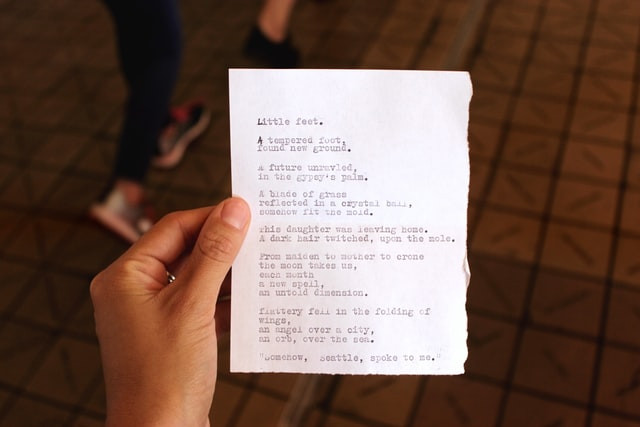
5 min
0
10.04.2022

We already know how to write an acrostic poem. Let's figure out how to write an elegy. Just like a eulogy, an elegy is also a kind of mourning written in the form of poetry. Because of the nature of the subject matter, it has a somber tone to the verse. If you have an assignment about writing an elegy, this article will thoroughly guide you about writing one, which is impressive enough to get you a grade of A.
Everything Important about an Elegy
The first thing you need to do is to know what an elegy is? It is a poem written in memoriam of a loved one. It can be your beloved, your pet, a thing you have prized the most, or an important figure in society. The word elegy has been extracted from the Greek word 'elegos', which means 'song of mourning'. An elegy is different from a eulogy and elegiac couplet.
An elegy is written like a speech and spoken on funerals whereas an elegiac couplet is a kind derivative of elegy written in the form of a classical couplet. There is a great emphasis given to the rhyme scheme of an elegiac mostly written in iambic pentameter whereas most of the modern elegies are written as Free Verse, without any significance to the rhyme scheme.
Structure of an Elegy

Mourning
The first part, generally a four-line stanza called a quatrain, deals with the lament on the loss of a loved one. Here you may talk about how you see the world now that the person or thing is gone. You may also write about the emptiness in your life because of that person's absence.
Emotions
Next comes your own emotions on losing somebody important. Here you will talk about how you feel about the death of the loved one. You can also talk about how others feel about it. Use metaphors to add to the intensity of your emotions.
Glorification
The poem will end by glorifying the dead person. In this part, you will write about the good deeds or life-changing actions of the dead. You will praise his worth in life and write about how the world and your life will not be the same again. At times, there is also the hope of reuniting after death in this section of an elegy.
Steps of Writing a Well-Written Elegy
Just like any other task, writing an elegy comes with its challenges. However, these challenges may be overcome if the right approach and instructions are adopted. Here are the steps you should take if you need to write an elegy.
Step 1 - Read Well
Being well-read will always benefit you, especially when you want to start writing yourself. So, before you begin to write an elegy, it is a good idea to read and analyze a few famous elegies in the world. Some of them are as under.
- John Milton's, 'Lycidas'. The poet writes this elegy in memory of a friend who was shipwrecked.
- Lord Alfred Tennyson's, 'In Memoriam'; wherein the poet mourns the death of a dear friend;
- William Wordsworth's, 'Elegiac Stanzas', written in memory of his brother. The poem follows the typical rhyming pattern of elegiac stanzas with the scheme of ABAB;
- Walt Whitman's, 'O Captain, My Captain', written on the death of Abraham Lincoln;
- Denise Rilley's, 'A Part Song', written to lament the death of his adult son.
- Thomas Gray's, 'Elegy Written in a Country Churchyard'. Gray is reflecting upon his own death as and when it approaches. In the poem, he is writing his own epitaph. The whole idea of death being the ultimate reality is too stark a reality, depicted in this masterpiece.
You may have a look at these few lines that serve as an example of an elegy written by W.H. Auden in memory of W.B. Yeats:
"He disappeared in the dead of winter
The brooks were frozen, the airports almost deserted,
And snow disfigured the public statues"
When you read these elegies, you will analyze the language, metaphors, and style used to convey the poet's innermost emotions over somebody's death. This will eventually help you in writing your piece of poetry.
Step 2 - Prepare Yourself
To write an elegy, you have to be first ready to pour your emotions out on paper, it's definitely a tough task for many. Just relax and go out on a solitude walk and let out your feelings for the lost one. Think about the person you have lost, his qualities, relationship with you, or the world. You can also write down the adjectives that describe him or think of an incident that has left its imprint on your mind. This will get you to write, even if it is prose. Once you have words on paper, you can weave them as you want.
Step 3 - Choose your Style
Unlike an ancient Greek, pastoral, or elegiac stanza written in a specific rhyme scheme, modern elegies are written in free verse. It would help if you chose your style of the elegy. Ask yourself. Do you want to write a rhyming poem? Or are you more comfortable writing in free verse? It is what you intend to achieve through your elegy that will direct your style. A free verse will be more suitable if you aim to write about specific details of a significant life event from the dead person's life and how it affected you or the world. In contrast, a pastoral elegy will best suit you if you intend to glorify the deceased by bringing in the gods and goddesses in your elegy. Similarly, if you want to make a song out of it, you would want your elegy to rhyme.
Step 4- Begin Writing
Now that you have prepared yourself enough, it is time that you sit down to write. Once you have let your feelings for the person you are writing about drench you, you will be able to pour them out on paper. Write about how the world has changed for you now that the person is no more. Let the emptiness be visible in your words. Let the world know of the gem it has lost.
Step 5 - Revise
A piece of creative writing can never be completed the first time around. It needs revisions and sometimes an umpteenth number of revisions. Once you have written your elegy, don't revise it immediately. Take a break and come back to it after a couple of days. This way, you will be able to look at it objectively and make relevant revisions.
Follow these steps, and you will be all set to write a heart-touching elegy.



